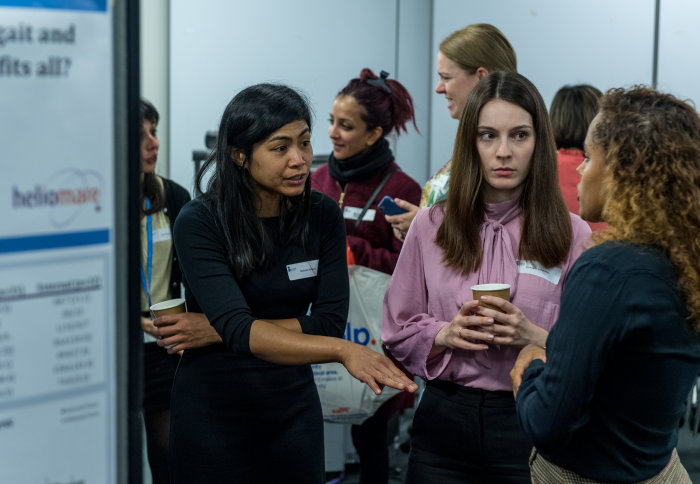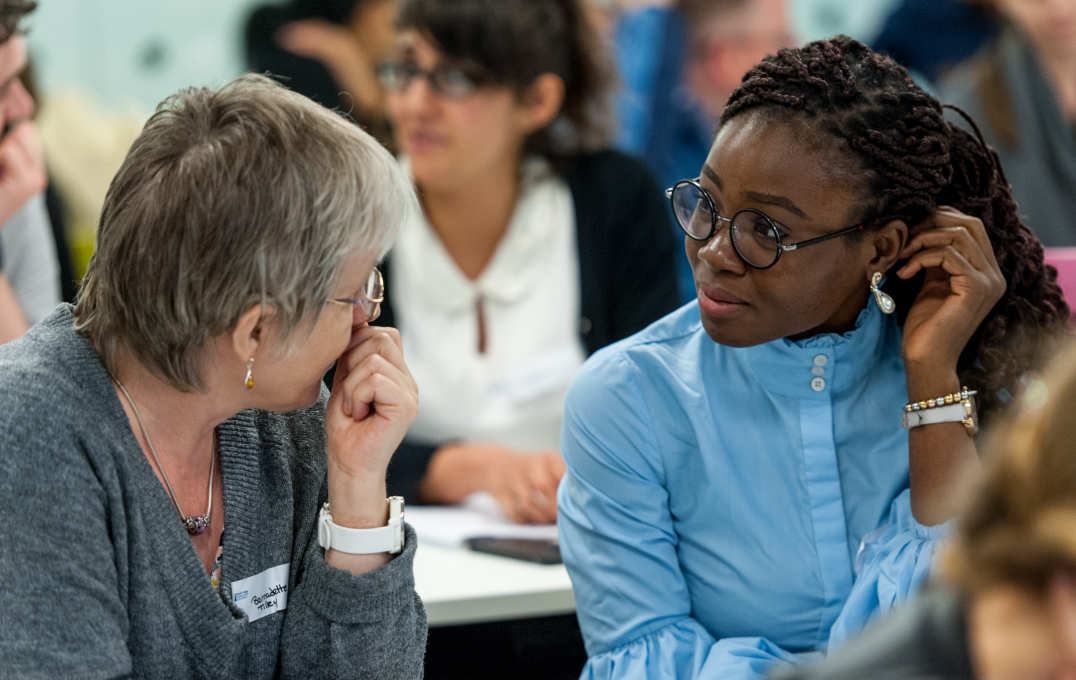Healthcare staff get tips on pursuing research careers at Imperial symposium
by Maxine Myers

Persistence, collaboration and mentorship are key for a successful research career, said experts at an event for healthcare staff this month.
More than 100 healthcare workers attended the annual North West London Research Symposium at Imperial College London. They heard about how to pursue a research career and saw examples of successful research projects carried out by peers in their area. The event was aimed at nurses, midwives, allied health professionals, pharmacists, clinical psychologists and healthcare scientists working in North West London who are interested in research or a clinical academic career.

Co-host of the event Professor Mary Wells, from the College’s Department of Surgery and Cancer, who is Lead Nurse for Research at Imperial College Healthcare NHS Trust, said:
“Research is important for driving improvements to clinical care and outcomes for our patients. However, conducting research isn’t always easy and staff can face challenges such as securing funding and dealing with rejection. This is why staff have to be persistent, collaborate with others and be supervised or mentored by those who have carried out research projects before.
“We want to encourage more healthcare staff working in different fields to do research and we run this event to showcase the breadth of research work their peers are doing and the opportunities available. It was great to see so many attendees at the event and it is my hope that those who attended are inspired to pursue a research career.”
Delegates saw an exhibition of posters showcasing research by healthcare professionals. They included a project conducted by Melanie Almonte, Research Nurse at Imperial College Healthcare NHS Trust, to assess whether babies born with an eye condition called retinopathy of prematurity (ROP) are at risk of developing other eye diseases, and a study looking at the impact of using nurse-led telephone assessment to initially assess patients who may have prostate cancer.
After viewing the posters, delegates were given the opportunity to vote for the best poster prize. This was awarded to Ryan Strother, physiotherapist at Imperial College Healthcare NHS Trust, and George Premmitt, physiotherapist at Oxford University Hospitals Foundation Trust. They carried out a study on the impact of bed height on the effectiveness of chest compressions during CPR.

Co-host of the event Dr Caroline Alexander, also from Imperial’s Surgery and Cancer, who is Lead Clinical Academic for Therapies at the Trust, added:
“This event was an opportunity for us to bring together a wider range of healthcare staff and show them how their contribution can help change the way we treat our patients, as well as advance their careers. It was great to see so many people at the event and the engagement, conversations and research displayed clearly show what can be achieved when we offer more of our clinical staff the opportunity to do research. There is a wealth of support available to staff and it is my hope that they will take full advantage of this so we can see more of this NHS workforce engaging in research.”
The event’s keynote speaker Professor Rebecca Malby, Professor in Health Systems Innovation at London South Bank University, spoke about her own research, which uses routine data to understand how healthcare is organised. She challenged delegates to use research findings to change current systems to deliver care.
Delegates had the opportunity to hear from peers at various stages of their research careers. Their presentations included summaries of the projects they carried out and the challenges they faced.

Clare Leon-Villapalos, from Imperial’s Department of Surgery and Cancer, who is Clinical Practice Educator in Critical Care at Imperial College Healthcare NHS Trust, presented preliminary data on her research looking into the ways in which staffing levels and workload have an impact on quality of care for staff working in critical care units.
“I never envisaged myself as a researcher but I have found the experience to be a rewarding one. I have learnt so much from working with my supervisors at Imperial College London and I felt incredibly supported throughout the process. I hope to publish my work in a journal and eventually build on my research work and become a clinical academic.”
There were also workshops on preparing for fellowship applications, getting research work published, health literacy and demonstrating research impact.
The event was organised by the Clinical Academic Training Office (CATO), which delivers training and education opportunities for clinical staff as part of the Imperial College Academic Health Science Centre (AHSC).
Providing education and training opportunities for clinical staff is a key mission of the Imperial AHSC, a joint initiative between Imperial College London, The Institute of Cancer Research and three NHS Trusts. It aims to transform healthcare by turning scientific discoveries into advances to benefit local, national and global populations in as fast a timeframe as possible.
Article text (excluding photos or graphics) © Imperial College London.
Photos and graphics subject to third party copyright used with permission or © Imperial College London.
Reporter
Maxine Myers
Communications Division



